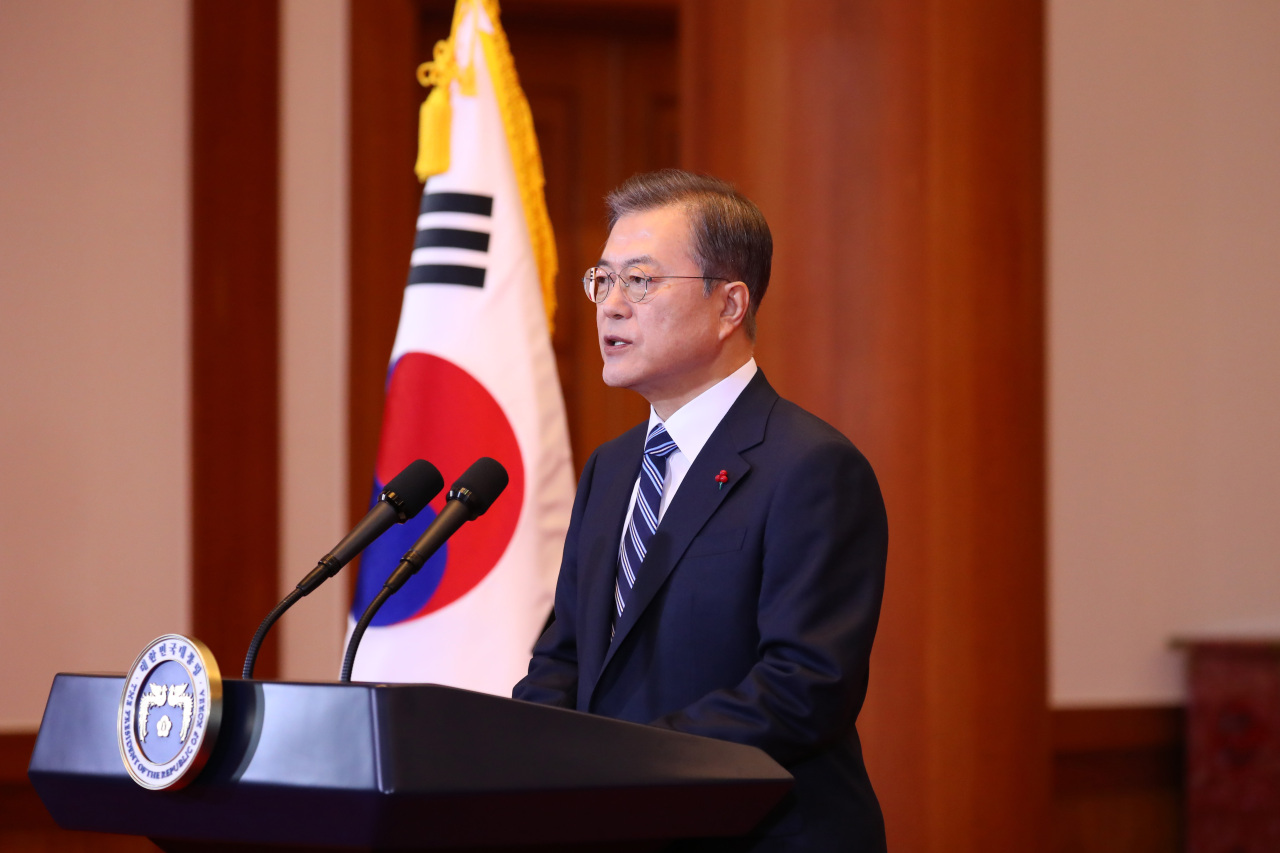Moon pledges to continue reform drive, improve ties with neighbors
By Choi He-sukPublished : Jan. 7, 2020 - 16:18
During his New Year’s address on Tuesday, President Moon Jae-in pledged to continue his reform drive and revitalize the economy while seeking to improve ties with neighboring countries including North Korea.
Moon also called for inter-Korean cooperation to establish conditions that would allow North Korean leader Kim Jong-un to visit the South. Furthermore, the president once again highlighted his administration’s drive to establish peace on the peninsula.
Moon also called for inter-Korean cooperation to establish conditions that would allow North Korean leader Kim Jong-un to visit the South. Furthermore, the president once again highlighted his administration’s drive to establish peace on the peninsula.

However, unlike his previous speeches that focused on improvements achieved during his term, Moon admitted to slow progress in North Korean issues.
“The need to seek practical measures to increase inter-Korean cooperation has become more pressing,” Moon said, adding that inter-Korean relations are backsliding amid a deadlock in US-North Korea denuclearization talks.
Saying that the two Koreas should seek ways to cooperate, Moon called on Pyongyang to discuss related matters and said he is willing to engage in dialogue and that his government will continue efforts to resume inter-Korean projects, such as the Kaesong industrial park.
Moon went on to say that the South Korea-US alliance will be strengthened while the country continues to diversify diplomatic relations through the New Southern Policy and the New Northern Policy.
The president also expressed hopes to improve ties with China, saying that the scheduled visits by Chinese President Xi Jinping and Premier Li Keqiang would be opportunities to improve Seoul-Beijing relations.
Moon voiced similar views on Japan but attached the condition that Tokyo remove its trade restrictions.
“The bilateral relationship of cooperation will evolve to be more future-oriented. If Japan retracts export regulations, bilateral relations could improve even faster,” Moon said, reiterating his administration’s position that the strained ties would not get better without Tokyo taking the first step.
The New Year’s speech by the president focused on economic issues ranging from real estate and job policies to supporting the growth of new industries and raising the country’s exports.
In 2020, the country will see economic recovery and people’s lives will improve, Moon said, adding that the government will ensure that people can clearly feel the changes in inclusiveness, innovation and fairness across society.
Citing the rise in employment figures last year, Moon said the government will work to expand the trend and pay attention to increasing employment among those in their 40s, and the manufacturing sector.
In addition, Moon revealed that he intends to adhere to the employment policies rolled out since his inauguration in 2017.
Listing measures such as the reduction of working hours and increases in the minimum wage, Moon said the government will roll out measures to allow people to feel the benefits of such changes.
Regarding industrial policies, Moon again stressed the need for innovation, and the government plans to boost bio-health, eco-friendly automobiles and system semiconductors.
“Venture, startup companies growth will be supported to facilitate the rise of more unicorn companies. The three new industries -- system semiconductors, bio-health and future car -- will be nurtured to be the second and third semiconductor industries,” Moon said.
The president also pledged increased investments in the materials and parts industries, to continue the drive to localize items for which the company has heavily relied on Japanese imports and to lay the foundation for making South Korea the world’s fourth-largest exporter by 2030.
Export-related measures listed by Moon include increasing exports in the “three new industries” and signing regional trade pacts.
Moon also reaffirmed his reform drive, saying the National Assembly’s passing of a bill on the formation of a new body to investigate high-level government officials took the country a step closer to creating a fair society.
“Once the laws and systemic foundation for reforming power organizations (are established), society will become fairer and a stronger social trust will be established,” Moon said. The term power organization refers to state bodies with investigative powers, such as the prosecutors’ office.
“Legal, systemic, administrative reform will not be stopped until (concerned organizations) are seen as organizations that work with the people.”
By Choi He-suk (cheesuk@heraldcorp.com)









![[Today’s K-pop] BTS pop-up event to come to Seoul](http://res.heraldm.com/phpwas/restmb_idxmake.php?idx=644&simg=/content/image/2024/04/17/20240417050734_0.jpg&u=)

![[Graphic News] More Koreans say they plan long-distance trips this year](http://res.heraldm.com/phpwas/restmb_idxmake.php?idx=644&simg=/content/image/2024/04/17/20240417050828_0.gif&u=)






![[KH Explains] Hyundai's full hybrid edge to pay off amid slow transition to pure EVs](http://res.heraldm.com/phpwas/restmb_idxmake.php?idx=652&simg=/content/image/2024/04/18/20240418050645_0.jpg&u=20240419100350)

